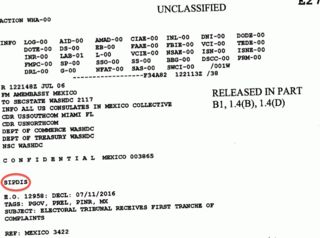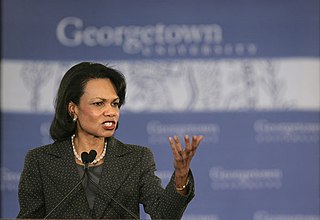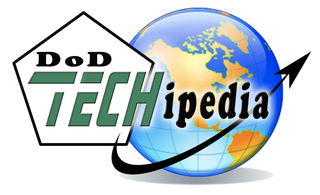
A wiki is a form of online hypertext publication that is collaboratively edited and managed by its own audience directly through a web browser. A typical wiki contains multiple pages for the subjects or scope of the project, and could be either open to the public or limited to use within an organization for maintaining its internal knowledge base.
In international relations, public diplomacy broadly speaking, is any of the various government-sponsored efforts aimed at communicating directly with foreign publics to establish a dialogue designed to inform and influence with the aim of building support for the state's strategic objectives. These also include propaganda. As the international order has changed over the twentieth century, so has the practice of public diplomacy. Its practitioners use a variety of instruments and methods ranging from personal contact and media interviews to the Internet and educational exchanges.

The Secret Internet Protocol Router Network (SIPRNet) is "a system of interconnected computer networks used by the U.S. Department of Defense and the U.S. Department of State to transmit classified information by packet switching over the 'completely secure' environment". It also provides services such as hypertext document access and electronic mail. As such, SIPRNet is the DoD's classified version of the civilian Internet.

Intelink is a group of secure intranets used by the United States Intelligence Community. The first Intelink network was established in 1994 to take advantage of Internet technologies and services to promote intelligence dissemination and business workflow. Since then it has become an essential capability for the US intelligence community and its partners to share information, collaborate across agencies, and conduct business. Intelink refers to the web environment on protected top secret, secret, and unclassified networks. One of the key features of Intelink is Intellipedia, an online system for collaborative data sharing based on MediaWiki. Intelink uses WordPress as the basis of its blogging service.
The Office of eDiplomacy is an applied technology think tank for the United States Department of State. The Office of eDiplomacy is staffed by Foreign and Civil Service Officers in a wide range of specializations. There are four branches: the Diplomatic Innovation Division (DID), the Knowledge Leadership Division (KLD), the Customer Liaison Division (CLD), and the Business Requirements Unit (BRU).

Intellipedia is an online system for collaborative data sharing used by the United States Intelligence Community (IC). It was established as a pilot project in late 2005 and formally announced in April 2006. Intellipedia consists of three wikis running on the separate JWICS (Intellipedia-TS), SIPRNet (Intellipedia-S), and DNI-U (Intellipedia-U) networks. The levels of classification allowed for information on the three wikis are Top Secret Sensitive Compartmented Information, Secret (S), and Sensitive But Unclassified information, respectively. Each of the wikis is used by individuals with appropriate clearances from the 18 agencies of the US intelligence community and other national-security related organizations, including Combatant Commands and other federal departments. The wikis are not open to the public.
The Joint Worldwide Intelligence Communication System is the United States Department of Defense's secure intranet system that houses top secret and sensitive compartmented information. JWICS superseded the earlier DSNET2 and DSNET3, the Top Secret and SCI levels of the Defense Data Network based on ARPANET technology.

Transformational Diplomacy is a diplomacy initiative championed by former United States secretary of state Condoleezza Rice for reinvigorating American Foreign Policy and the United States Foreign Service.

The history of wikis began in 1994, when Ward Cunningham gave the name "WikiWikiWeb" to the knowledge base, which ran on his company's website at c2.com, and the wiki software that powered it. The wiki went public in March 1995, the date used in anniversary celebrations of the wiki's origins. c2.com is thus the first true wiki, or a website with pages and links that can be easily edited via the browser, with a reliable version history for each page. He chose "WikiWikiWeb" as the name based on his memories of the "Wiki Wiki Shuttle" at Honolulu International Airport, and because "wiki" is the Hawaiian word for "quick".
Bureaupedia is a wiki used internally at the FBI with the intention of capturing the knowledge of senior agents and reduce knowledge loss due to retirement.

Wikimania is the Wikimedia movement's annual conference, organized by volunteers and hosted by the Wikimedia Foundation. Topics of presentations and discussions include Wikimedia projects such as Wikipedia, other wikis, open-source software, free knowledge and free content, and social and technical aspects related to these topics.

DoDTechipedia is a wiki developed by the United States Department of Defense (DoD), to facilitate increased communication and collaboration among DoD scientists, engineers, program managers, acquisition professionals and operational warfighters. DoDTechipedia is a living knowledge base that reduces duplication of effort, encourages collaboration among program areas and connects capability providers with technology developers. DoDTechipedia runs on Confluence wiki engine, unlike a number of MediaWiki-based government wikis like Diplopedia and Bureaupedia.
DipNote is the official blog of the United States Department of State. It was started on September 25, 2007, with a first post by the U.S. Assistant Secretary of State for Public Affairs Sean McCormack. DipNote was revised in 2009, with the Departments' 21st Century Statecraft initiative. DipNote works in conjunction with other public diplomacy programs, as part of former Secretary of State Hillary Clinton's smart power initiatives.
Communities @ State is one of the U.S. government's internal blogs to promote inter-agency dialog.
US Secretary of State Hillary Clinton asked for the creation of an online forum for State Department employees to submit ideas directly to the Secretary. The Sounding Board was an intranet blog developed and launched in February 2009 by staff from the State Department's Office of eDiplomacy.

Enterprise social networking focuses on the use of online social networks or social relations among people who share business interests and/or activities. Enterprise social networking is often a facility of enterprise social software, which is essentially social software used in "enterprise" (business/commercial) contexts. It encompasses modifications to corporate intranets and other classic software platforms used by large companies to organize their communication, collaboration and other aspects of their intranets. Enterprise social networking is also generally thought to include the use of a standard external social networking service to generate visibility for an enterprise.

Richard Boly is a former career U.S. diplomat and former Director of the Office of eDiplomacy, an applied technology think tank for the U.S. Department of State. Previously, he was a National Security Affairs Fellow at the Hoover Institution at Stanford University, where he launched the Global Entrepreneurship Program.

Cyber-diplomacy is the evolution of public diplomacy to include and use the new platforms of communication in the 21st century. As explained by Jan Melissen in The New Public Diplomacy: Soft Power in International Relations, cyber-diplomacy “links the impact of innovations in communication and information technology to diplomacy.” Cyber-diplomacy is also known as or is part of public diplomacy 2.0, Digital diplomacy, EDiplomacy, and virtual diplomacy. Cyber-diplomacy has as its underpinnings that, “it recognizes that new communication technologies offer new opportunities to interact with a wider public by adopting a network approach and making the most of an increasingly multicentric global, interdependent system.”

Katherine Roberts Maher is an American businesswoman. She is the incoming chief executive and president of NPR. She will begin her tenure in March 2024, succeeding John Lansing. Before accepting the position at NPR, she served as chief executive officer of Web Summit and chair of the board of directors at the Signal Foundation. She will continue as Web Summit's CEO until March, then will remain with the group as their non-executive chairperson. She is a former chief executive officer and executive director of the Wikimedia Foundation.
GCTools is a suite of enterprise digital collaboration applications maintained by the Canadian Government. It consists of:













